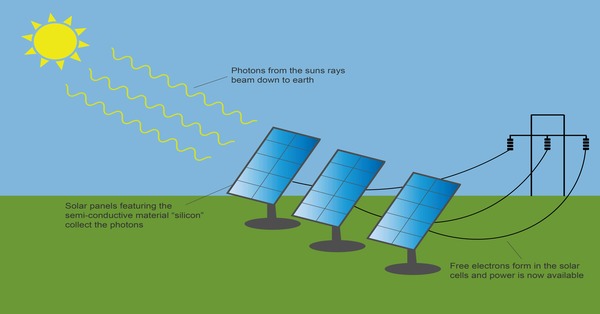The Advantages of Solar Energy: Harnessing the Power of the Sun
At [Your Company Name], we understand the immense potential of solar energy and its numerous advantages. In this article, we will delve into the various benefits of solar energy and how it can revolutionize our energy systems. Let’s explore the advantages of solar energy in detail:
Renewable and Sustainable
Solar energy is a renewable and sustainable source of power. Unlike fossil fuels, which are finite and contribute to environmental degradation, solar energy harnesses the power of the sun, which is available abundantly. By utilizing solar energy, we can reduce our dependence on non-renewable resources and minimize our carbon footprint.
Cost Savings
Investing in solar energy can lead to substantial cost savings in the long run. While the initial installation costs may seem significant, solar panels have a lifespan of 25-30 years with minimal maintenance requirements. By generating your electricity, you can significantly reduce or eliminate your monthly electricity bills. Additionally, some governments and utilities offer incentives and tax credits for adopting solar energy, making it even more financially attractive.
Energy Independence
Solar energy provides individuals and communities with energy independence. By generating your electricity, you are no longer reliant on the grid and vulnerable to power outages or price fluctuations. This independence grants you greater control over your energy consumption and allows you to contribute to a more resilient and decentralized energy system.
Environmental Benefits
Solar energy is a clean and environmentally friendly alternative to traditional energy sources. By utilizing solar power, we can significantly reduce greenhouse gas emissions, air pollution, and water usage associated with conventional electricity generation. Solar energy systems produce no harmful emissions and have a minimal impact on the environment, helping to combat climate change and preserve our planet for future generations.
Job Creation and Economic Growth
The widespread adoption of solar energy creates numerous job opportunities and contributes to economic growth. The solar industry requires skilled professionals for installation, maintenance, research, and development. By investing in solar energy, we can stimulate local economies, foster innovation, and create a sustainable workforce for the future.
Versatility and Scalability
Solar energy systems can be deployed in various settings, ranging from residential rooftops to large-scale solar farms. This versatility allows for the integration of solar power in diverse locations, including urban areas with limited space. Furthermore, solar energy systems can be easily expanded, allowing for scalability to meet increasing energy demands.
Technological Advancements
The solar energy industry continues to witness rapid technological advancements, leading to increased efficiency and affordability. Innovations such as solar battery storage systems and solar-powered transportation are revolutionizing the way we harness and utilize solar energy. Embracing these advancements can drive further progress and make solar energy an even more viable and accessible option.

Solar energy offers a multitude of advantages that can transform our energy landscape. From its renewable nature and cost savings to its positive environmental impact and job creation potential, solar energy presents a compelling case for widespread adoption. By harnessing the power of the sun, we can pave the way towards a sustainable and prosperous future.
Frequently Asked Questions about the Advantages of Solar Energy
1. What are the main advantages of solar energy?
Solar energy is renewable, reduces electricity bills, requires low maintenance, and helps reduce carbon emissions.
2. How does solar energy help the environment?
Solar energy helps reduce greenhouse gas emissions, air pollution, and dependence on fossil fuels, leading to a cleaner and healthier environment.
3. Can solar energy save me money?
Yes, solar energy can significantly reduce your electricity bills, especially in the long run, as it utilizes free and abundant sunlight as its source.
4. Are there any government incentives for installing solar panels?
Many governments offer incentives such as tax credits, grants, and rebates to encourage the adoption of solar energy systems.
5. Is solar energy reliable?
Yes, solar energy is reliable as long as there is sunlight available. Additionally, with the advancement of energy storage technologies, solar systems can provide electricity even during cloudy days or at night.
6. Can solar energy be used in all locations?
Solar energy can be used in most locations around the world, as long as there is sufficient sunlight. However, the efficiency may vary depending on the geographical location.
7. How long do solar panels last?
Solar panels typically have a lifespan of 25-30 years. However, their performance may slightly degrade over time.
8. Do solar panels require a lot of maintenance?
No, solar panels require minimal maintenance. Regular cleaning to remove dirt and debris is usually sufficient.
9. Can solar energy be used for heating?
Yes, solar energy can be used for water heating, space heating, and even for heating swimming pools.
10. Can solar energy be used for large-scale electricity generation?
Yes, solar energy can be harnessed for large-scale electricity generation through the use of solar farms or solar power plants.
11. Are there any disadvantages of solar energy?
Some disadvantages include high initial costs, intermittent availability, and the requirement of sufficient roof space for residential installations.
12. Can solar energy be used during power outages?
Yes, solar energy systems equipped with battery storage can provide electricity during power outages, ensuring a continuous power supply.
13. Can solar energy be used in remote areas?
Yes, solar energy is particularly beneficial for remote areas where grid connection is challenging or expensive.
14. Can solar energy be used for charging electric vehicles?
Yes, solar energy can be utilized for charging electric vehicles, reducing reliance on fossil fuels and promoting sustainable transportation.
15. How does solar energy contribute to energy independence?
Solar energy reduces dependence on external energy sources, such as imported fossil fuels, thereby promoting energy independence and security.




